Civil Party Sou Sotheavy Continues Testimony About Forced Marriage
Today, Civil Party Sou Sotheavy concluded her testimony. She spoke about her experience as a transgender woman under the Khmer Rouge regime. She was forced to marry, imprisoned, and forced to work. Since reserve Civil Party 2-TCCP-264 could not testify due to health reasons, the court adjourned early at around 2 pm.
Detention
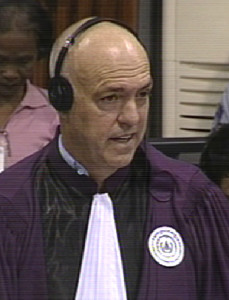
International Co-Prosecutor Nicholas Koumjian
Trial Chamber President Nil Nonn was still absent and replaced by Judge Ya Sokhan. Civil Party 2-TCCP-264 was on the reserve and Sou Sotheavy was heard. The Co-Prosecution continued yesterday’s questioning of the Civil Party. Mr. Koumjian asked how long she was detained at Kraing Ches. She replied that she was detained there “for quite a long time.” In the interrogation cell, there were hammers, and pliers to remove nails. She did not witness torture by other people herself, but could hear the screaming of other people at midnight. There were all kinds of people: men, women and transgender. They were detained in a “pit”, she said: it was filled with bamboo sticks and leaves. It was located in Ang Khnor in Takeo Province. Ms. Guissé interjected and said that the questions did not fall into the severance order. Mr. Koumjian explained that the Co-Prosecution held the position that they were part of a national policy. Judge Claudia Fenz said that the Co-Prosecution’s questions would be allowed, provided that they be brief.
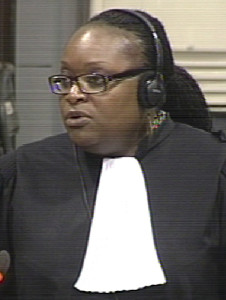
Khieu Samphan Defense Counsel Anta Guissé
Mr. Koumjian asked whether she was detained at Phnom Sanlong, which Ms. Sotheavy confirmed. She explained that she had to break rocks there. They would be deprived of food if they could not reach a certain quota. They did not know about the offenses they were accused of. When Mr. Koumjian asked another question regarding this Security Center, Ms. Guissé objected again and said it fell out of the scope. Mr. Koumjian replied that it was “all very relevant” to the national policy. Asked whether people disappeared, she said that people were sent to study sessions, which had a different connotation, she said, than nowadays. The execution site was not located there, however. It was located on the West of the mountain. She only lived in Takeo for a brief period of time. She lived in Kandal Prison after living in Sanlong Prison. She did not witness any Vietnamese living there. She did not know about family members of other people. Her family members had all been killed, including distant cousins. She said that they totaled 16 people. Her father was a former soldier, as were other family members and herself before 1975. She said that the Khmer Rouge knew that her family members were former soldiers, which was, she argued, why they were targeted.
She knew about Kraing Ta Chang Prison in Tram Kok. She was sent to stay there overnight. She was kept outside the building. She explained that she left the area the next morning and was told that she only committed a minor offense. Some of her family members were detained at Kraing Ta Chan.
Marriage Regulations
The floor was granted to the Nuon Chea Defense Team. Mr. Liv Sovanna, who asked about her former profession. He said that she had told the court that she was a singer in a bar and that she was a soldier, too, before 1975. He asked whether she was also an actor, for example. She replied that she was a singer, and could also perform in a theater, but was not an actor. She was also a medic in the military. Her education was rather low, she said. She finished it in the School of Arts.
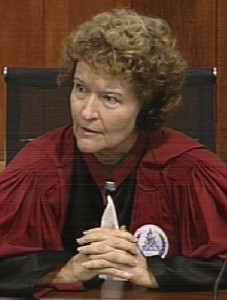
Judge Claudia Fenz
As for marriage regulations, she said that it started in 1977. She was forced to cut her hair and later she was forced to get married. “I told the court about that that my mother was very old, and that if I was to marry, it was to look after my mother”. She was forced to marry in August 1977. She was threatened to be killed several times. Judge Fenz interjected and instructed Mr. Sovanna not to ask repetitive questions. When he asked who forced her to get married as the next question, Judge Fenz told him to ask only questions that went beyond that had already been asked. “We’re not here to hear the same question again and again”.
Nuon Chea Defense Counsel Doreen Chen responded by saying it was Nuon Chea’s fundamental human right to challenge evidence. Asking nuanced questions that were only seemingly repetitive was “our fundamental right”, Ms. Chen argued. Judge Fenz explained that challenging testimonies were indeed the right of the defense, but that it stood against the prohibition of asking repetitive questions. Defense Counsels should convince her that the questions put to the Civil Party by Liv Sovanna were not repetitive and asked for nuances.
Mr. Sovanna moved on. Ms. Sotheavy said that she did not know the names of the people who forced her to marry. She told her spouse to wear the scarf on her head. If it had been found out, they would be killed. “If you still don’t get the answer, I do not know how to help you”. Her wife was a quiet person, so she did not say much. “You ask me the same question. You asked about the would-be wife that I had to marry. In fact, we could only marry a man or woman from the same group.”
When Mr. Sovanna asked how many people were under the supervision of the unit chief, she replied that she did not know. There were two rows. The second row were Base People. She was not told the names of how many people addressed the crowd the day of her marriage. She replied that there was only one person who spoke. Mr. Sovanna put further questions to the Civil Party that revolved around the ceremony as such, including the position of the couple, for example. When he asked her where in the eighty couples they stood, she corrected him: “please state it correctly”, and repeated that 107 couples were present. She stood around one or two meters apart from her wife.
She did not remember how many months after the marriage they consummated their marriage. She could not recall how many times they were questioned about their consummation before they decided to have sex. Mr. Sovanna asked whether the consummation was voluntary at the moment that they consummated the marriage. “I did not have any feeling for any woman. And if you listen to me carefully, you understand about the nature of a transgender woman. […] What I did was out of fear of being killed”. Mr. Sovanna inquired why she was afraid of being killed. She answered that that “they had measures” and that she was called for re-education several times. They were not in the same mobile unit. Other people committed suicide, because they refused to get married. They were working in another mobile unit that was nearby. She knew this before she got married. She learned it from other people.
At this point, the President adjourned the hearing for a break.
After the first break, National Civil Party Lead Co-Lawyer Pich Ang had a request regarding 2-TCCP-264. He said that she had a health issue and that she was under examination of the ECCC physician. It seemed that she was not available to testify today.
She explained that a transgender person drank poisoned water. She was told that the reason for this suicide was that this person was forced to marry. She could not remember their names. Mr. Sovanna then asked how many people were called Saray in the group of singers. She explained that there were two Sarays. One was shot dead by the Khmer Rouge in a room. Sinat and Nay could escape. Rotha and other people died in that room.
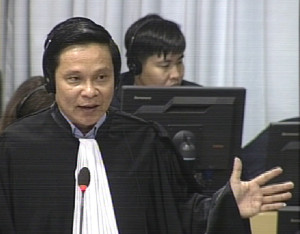
Nuon Chea Defense Counsel Liv Sovanna
She stayed at Kraing Ta Chan for one night. The next morning, they left. “In fact, I spent time walking for a short period of time”. It was in late 1978 or early 1979. She got married in August 1977. When she was sent to Kraing Ta Chan there was gunfire, but she could not hear it herself. This was why they told her that she had to be sent to Kandal Province.
She had fifteen siblings, including herself. One of them was female, the rest were male. She then listed the names of her siblings.
Background of the Civil Party
The floor was granted to Nuon Chea Defense Counsel Doreen Chen. She wanted to know how Ms. Sotheavy knew that her wife was an orphan. She replied that they had known each other, because they were in the same mobile unit. When they were allowed to meet each other, Ms. Sotheavy asked her about her siblings, and she had told her that she was an orphan. They had known each other “long time” before her marriage. Ms. Chen then wanted to know when she realized that she had to find a woman to pretend to be husband and wife. At this point, International Civil Party Lead Co-Lawyer Marie Guiraud asked for references in the transcript. Ms. Chen inquired whether she understood it correctly that while in line waiting for their marriage, no one could talk. She replied that the Base People were required to stand in two lines, as were the New People, and both were quiet. Ms. Chen wanted to know how she was able to speak to her wife about wearing a scarf if she was not allowed to speak when standing in line. Ms. Sotheavy replied that she played hide and seek, but that she was “trying to use it”. She did not discuss the matter (about the scarves) during the ceremony, but before. No one told her that she would get married on a specific date, but they had known about the plan to marry people since February 1977. “We had learned that something would happen, because my instinct told me”.
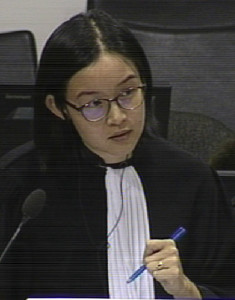
Nuon Chea Defense Counsel Doreen Chen
Ms. Chen then moved on and asked about the monitoring of the consummation of marriage. She wanted to know how Ms. Sotheavy knew that they were spying on the couple was about the consummation of marriage, and not about whether they were CIA or KTB agents, for example. She replied that she saw them “crawling like snakes”. She saw marks and footprints the next morning. Ms. Chen wanted to know how she knew what they were looking for. She replied that it was her conclusion. People who were suspected of being KTB and CIA agents would be monitored every two or three days, while they were monitored about the consummation of their marriage the night of their wedding.
Ms. Chen moved on and inquired whether the day that they consummated their marriage was the only time that she had sex with a woman. Ms. Sotheavy replied that she had said that she did not like women. “Like now, […] I don’t have any feeling for any women”. She said that she had sex with a woman only once. She came to see her wife around every ten days. She arrived at around 3 or 4 pm and stayed with her until around 6 pm, when she returned to her worksite again. She did not stay overnight.
Questioning by the Khieu Samphan Defense Team
The floor was granted to the Khieu Samphan Defense Team. National Counsel Kong Sam Onn asked at how many locations she stayed during the Khmer Rouge regime. She explained that she first stayed in Phnom Penh, and then went to Champa Pagoda. May 30, she went to a mobile unit. After this, she was relocated to several other locations. She met several transgender people, but did not know how many. She did not see them in big groups. They could recognize each other immediately, because they had the same gender. “To my estimation, there were quite a number of transgender people that I met”.
Mr. Sam Onn then inquired about a person called Sorn, who she had a love affair with after his marriage. Mr. Sam Onn wanted to know whether this person had other functions than unit chief. She replied that he was the unit chief while she was at Sanlong Prison. “He was my partner”. Sorn himself never told her that he was a unit chief, but he concluded this from his own observations, since he issued orders to his subordinates.
Mr. Sam Onn read an excerpt of the Civil Party’s statement, in which she had said that children crawled under the house to monitor them, and not militiamen as she had said this morning.[1] She replied that they were young adults or adolescents, which was why she sometimes said children. “Usually people who were in the militia were about 12 to 13 years old”. She explained that they were of this age judging from their appearance. The rifles touched the ground when they were carrying them. She knew that she was being monitored, because they crawled under the house.
Mr. Sam Onn quoted her statement, in which she had said that there was no “presence of commune of village chiefs” at the wedding, and contrasted it with her statement in which she had said that district and commune chiefs were present.[2] She explained that she did not know their names and that they were representing districts, but she insisted that they were present. When they made a speech, they introduced themselves. “The statement I made was not proper”. At this point, the President adjourned the hearing for a break.
Monitoring Newlywed Couples
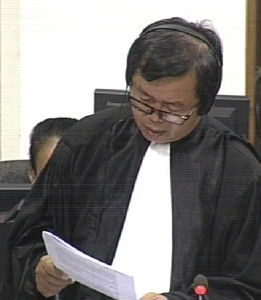
Khieu Samphan Defense Counsel Kong Sam Onn
After the lunch break, Mr. Sam Onn inquired about the monitoring of other couples. She replied that she did not have time to discuss this matter with other couples. She did not know how many unit chiefs there were in the commune. She did not know who the unit chief of group chiefs were. “I never used the word group chiefs”. Mr. Sam Onn quoted another excerpt of her interview, in which she had said that militiamen surveyed the house.[3] He wanted to know how he knew that the militiamen were assigned to survey the house. She replied that “it is for sure that they were assigned by the unit chiefs”, since she knew that they monitored the house. Mr. Sam Onn asked whether she disclosed “this issue – that is your gender to them”. She replied that if she had disclosed that she would have been killed if she disclosed this information. She told her wife that she was a transgender person after their marriage. Mr. Sam Onn asked whether she was aware that her wife was dissatisfied that she was a transgender and disclosed this to other people. Ms. Sotheavy replied: “She did not have any regret, because of the fact that she did not have affairs with me. I had discussions with her during the time when I told her to wear her scarf around her head […]. At the time she may have found out my gender”. Her wife never told her whether she was unhappy about this. Mr. Sam Onn asked whether she knew how wedding ceremonies were traditionally organized before 17 April 1975. She replied: “You would know about traditions before 1975. I do not need to tell you about the tradition or customs in the wedding ceremony or party. The tradition during the Pol Pot time were different. People were forced to get married.” She continued: “I do not know about the foreigners. Maybe the foreigners do not know about the traditions”. She then explained that on day one, monks would traditionally be preaching. Day two was traditionally the day of the wedding procession. However, there were no sermons preached by monks during the Khmer Rouge and no wedding processions. They were given black rubber sandals, black clothes and scarves. She had heard of parents marrying their children. She then explained that if a boy loved a girl, he could tell his parents and they could agree to the marriage. “Some children are more or less forced to marry. […] But it was different in the Khmer Rouge time.”
She herself never attended meetings. However, the organized marriages for youths were initiated in February 1977. “I learned it clearly when they came to cut my hair short”. Mr. Sam Onn quoted the principles of marriage stipulated about moral offenses: both parties had to agree and the collective had to agree.[4] He asked whether she ever heard these principles applied during Democratic Kampuchea. “This is the first time that I have heard the principles”, she said. “I do not have any hatred or anger against the accused”, she said, and explained that she did not have any reaction to the principles.
Mr. Sam Onn then inquired about the other couples attending the ceremony and said that she had said “117 couples”, and not 107 couples. She replied that: “I would like to declare before this chamber that I have never mentioned the number of 107 couples”. “I declare, solemnly declare, that I will be defeated if I am talking something that is not true”. She repeated that her elder sister-in-law had told her that she had a daughter. This in-law was related to herself, she said, since her wife was an orphan.
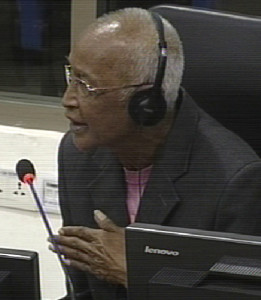
Civil Party Sou Sotheavy
Ms. Sou Sotheavy was then given the opportunity to give a statement on harm and suffering and put questions to the accused. She declined to put questions to the accused, “since it will not benefit me, [nor will it] bear any benefit.”, since they never responded.
“However I feel the most pain for the losses of my siblings or my parents. I saw two of my siblings who were tied up and walked in front of me and I lodged a complaint in front of this court in order to express the pain […] I lost everything. I lost the warmth of the family and there is nothing else important in that. I had wept for a long time until my tear dried up, and what happened under the regime of the three years and eight months period, I cannot forget about it […] I was looked down upon […]. I was sexually abused due to my transgender nature. I lost conscience. I had physical injury and this is just what I remembered, there is still more […]. I have poor eyesight sue to the injury, and also my right leg is handicapped from the chain that was put on during my imprisonment. I want to express this suffering and harm so that people understand that I suffered, I suffered from that act. And I know that my day is coming soon, since I am now 78 years old. Maybe this is the karma that I received for what I did from my previous incarnation or life.”
Presiding Judge Ya Sokhan thanked the Civil Party and dismissed her. He announced that Civil Party 2-TCCP-264 has fallen ill last night and that 2-TCCP-232 would be on reserve tomorrow. If 2-TCCP-264 was still unavailable tomorrow morning, he instructed the parties to be prepared to start questioning 2-TCCP-232. The hearing will resume tomorrow, August 24, 2016, at 9 am.
[1] E3/7529, at 00279735 (KH), 00279718-19 (EN), 00845996 (FR).
[2] E3/4609, at answer 53.
[3] E3/4609, at answer 54.
[4] E3/765, KH ending at 94 , 00540024-25 (FR), 00539994 (EN).
Featured Image: Civil Party Sou Sotheavy (ECCC: Flickr).
